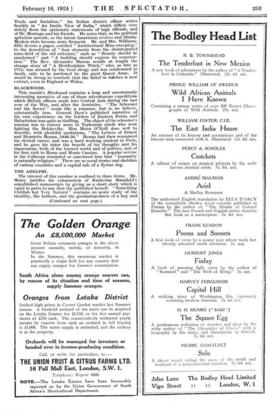THE ADELPHI.
The interest of this number is confined to three items. Mr. Murry justifies his exhumation of Katherine Mansfield's unpublished manuscripts by giving us a short story which is equal in parts to any that she published herself. "Something Childish but Wry Natural" contains an acute study of the timidity, the bothers, and the goodnaturedness of a boy and (Continued on next page.)
girl in love for the first time. Maxim Gorki's reminiscences of Andreev are interesting, too ; though Gorki has always a concealed and confused grudge against the friends he describes. The third item is a quotation from Hermann Melville. We were surprised to see him set down with agreement the very mystical statement that unconsciously we know the solution of all the problems which worry us. Of the other contributions Mr. Tomlinson's and Mr. Massingham's articles are the most agreeable. "The Journeyman" writes of his meditations while he was reading the Bible in bed - it does not seem to be a profitable mode of study. Mr. D. H. Lawrence shows how close he can come to the style of Mr. Aleister Crowley. Mr. Murry's editorial is somewhat too facetious, and intrusively personal ; we would not, however, discourage him from doubting whether his more evangelical moments come from his better self. But he is an awkward 0-Ian to deal with; he states, quite finally, "Of course, I don't accept anybody's evidence as to what I am or the quality of my behaviour.'











































 Previous page
Previous page